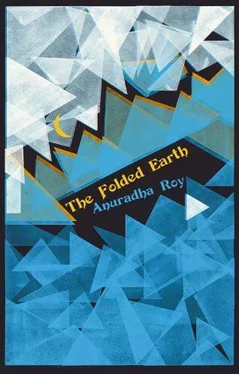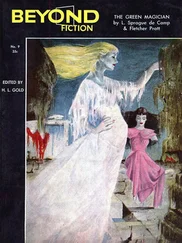Her back was against a giant chestnut tree. He stood facing her, barricading her between his arms against a tree. I heard him saying, “I will be back, you’re not to worry, I will be back. You must wait. I’ll write to you.”
She said, “You’ll write!”
“Yes!” he said, fervent. “Every week. Every day.”
She turned her face up to him and I could see tears in her eyes. In a mumble so quiet I could hardly hear it, she said, “But I can’t read. I can’t read or write. I never learned.”
He looked flummoxed for a second. Then in a pleading voice he said, “I’ll do everything else. You just have to learn to read and write. Or find someone to read for you.”
She laughed despite the tears. “And how will I get someone else to read out your letters? What will you write about? What you cooked for lunch, what the manager said to you?”
He buried his fingers and then his face in her hair. “I’ll write in riddles,” he said. “It is only you who will know what I am saying.” He twisted the studs in her ear and said, “Give me one of these, and when we meet again, it’ll be back with the other. It’ll be our lucky charm.”
It was about a fortnight later, early in May, that Charu came to me with a letter from her friend “Sunita” and asked me to teach her to read and write.
It was early one morning that summer, Diwan Sahib still rumpled with sleep, holding his mug of tea, and I on my way to school, cutting through his lawn. A distant humming sound that came closer every second had stopped me in my tracks and brought him out from his bedroom in his night-clothes.
The sound resolved itself into an olive green helicopter and I said, “It’s just a helicopter.” As I started on my way again, Diwan Sahib said, “It may not be just a helicopter. Not in an army town. Have you any idea what goes on here? This is a town that lives by secrets. State secrets. Army secrets. Grubby little personal secrets.”
He looked more ill-tempered and bleary-eyed than was usual for his early mornings, and looked set to embark on a long story I would not be able to interrupt. I quickened my pace and shouted over my shoulder at him, “It is just a helicopter, and I’ll see you after school.”
That day however, the helicopter noise was insistent, and there were two of them: circling the forests, first coming down very low, then swooping away in another direction, chopping up the sky with their blades. Was it a General visiting, or did a forest fire needed monitoring? Each time the sound approached, people paused in whatever they were doing to look up and puzzle over it.
The restless sound echoed through the skies all day. By mid-afternoon we noticed dark plumes of smoke in the distance, and some people claimed they had heard an explosion. At Bisht Bakery, both customers and bakers were agreed that the Army was trying to find a Chinese spy who had slipped in through the northern border. By the time I reached Negi’s tea stall, the consensus had changed: an escaped terrorist was on the run and had set fire to something important.
On my way back from Negi’s, at about three o’clock, I saw Veer’s jeep turning a bend. I paused, waiting for him to stop and pick me up to drive me to the Light House, with a long detour for samosas. This was our ritual when he was in town. But today he drove past without even a wave. The road was empty. It was narrow. I had to stand aside to let him pass. He was close enough for me to see that he was wearing his dark glasses and a white shirt, that his backpack was on the seat next to him. I stayed where I was, sure he would realise his mistake and slam on his brakes further down the road.
The sound of his jeep died away. Once the cloud of diesel fumes cleared I resumed walking. I made myself focus my attention on the orange creeper that climbed a nearby pine, the yellow-throated marten that was making its way up a tree trunk, the kalij pheasants scuttling in the undergrowth, the mysterious fragrance that always hung over that particular curve on the road — all the while pushing away the thought that Veer had seen me and had not stopped.
When I reached Diwan Sahib and gave him his newspaper, I waited as long as I could, sipping my over-sweet tea, before asking with elaborate casualness, “Where’s Veer disappeared to?”
“He left all of a sudden,” Diwan Sahib said. “That boy’s a mystery to me. He was sitting here, staring at his computer, when his phone rang and within five minutes he was out of the house and in his car. Without a word to me. All he said to Himmat was that he would be away for a few days.”
“Do you think it has anything to do with — ” I looked up at the sky.
“What? Do you mean with this business of the helicopters?” Diwan Sahib said. “As far as I know, our young man has nothing to do with the Army or with helicopters. But I’m the old fool, the senile drunk, I’d be the last to know anything.” He looked as bad-tempered as he had that morning. After a minute’s silence he threw me one of his unexpected questions.
“How old were you during the Bangladesh war?”
I tried to remember when the Bangladesh war had been, without giving my ignorance away, but he knew me too well. “1971,” he said in a voice that could have cut glass.
“Do you know Michael and I had the same birthday?” I said. “Once we added up our ages and had a cake with 44 candles on our birthday. It was a chocolate-cream cake and it had two white sugar mice with pink eyes, I remember. I ate one of them and the tail got stuck in my throat because it was made of a dried noodle.” I giggled at the memory.
Diwan Sahib was looking at me as if I had lost my mind. Then he dismissed me with a you-foolish-woman shake of his head and I resigned myself to the story that had been postponed since that morning. During the Bangladesh war, one of the intriguing political figures was Maulana Abdul Hamid Khan Bhashani, Diwan Sahib said, a man he remembered from pre-independence days. He was a largely self-educated villager who had turned fervent socialist. He threw himself into every revolt that came his way in British times, from the Khilafat movement to the non-cooperation movement. In the last days of the British Empire, it was rumoured that he had come to Surajgarh for a secret meeting with the Nawab to plot the state’s secession from India, but that was the time the Nawab had put Diwan Sahib in jail for plotting the opposite, so the Maulana and the Diwan had not met.
By 1970, Diwan Sahib went on, the Maulana was ninety, but still an incendiary demagogue, now fighting for Bangladesh’s independence from Pakistan. Although he was violently against India, like most Bangladeshi political leaders he took refuge in this country when the war started. He was a frail old man of volatile temper, given to making provocative statements. He had to be kept out of the public eye, far away from the newspapers. Which place was secluded and secret enough? Naturally, Ranikhet, Diwan Sahib said, a town whose secrets were kept by the hills, by its remoteness, by the Army.
The Maulana hated the mountains. He kept urging the Indians to give him a few acres of land nearer Bangladesh, in Assam where his son was buried. But he was not allowed to leave Ranikhet until the war was over.
The helicopters drew closer again and louder. Diwan Sahib shouted over the noise, brandishing a book at me. “And do you know when I found out about this? Yesterday. From a book! Here was this walking archive, lodged maybe a mile away from me in one of those army houses, and I had no idea.” The sounds died down as the helicopters circled away and Diwan Sahib shook his head irritably at them. “Nothing makes you as irrelevant as retirement, Maya. There was a time when Nehru and Patel trusted me with secrets. All these bloody generals in Ranikhet used to beg for invitations to this house. And now?” He withdrew into scowling silence.
Читать дальше












